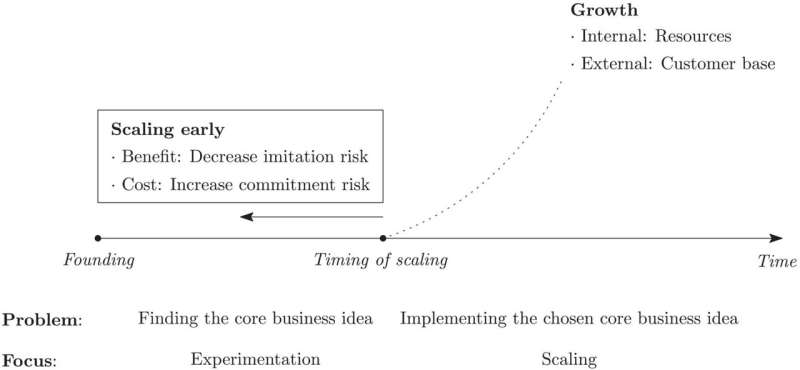This article has been reviewed according to Science X's editorial process and policies. Editors have highlighted the following attributes while ensuring the content's credibility:
fact-checked
peer-reviewed publication
proofread
Despite the desire to reduce the risk of imitation, research suggests startups should scale slowly and steadily

A recent study published in the Strategic Management Journal cautions startups against prioritizing early scaling, as it's positively associated with a higher rate of firm failure—especially for platform companies. Although managers could see the potential benefits of scaling as a way to prevent competitor imitation, scaling early can also prematurely curtail learning through experimentation and committing to a business idea that lacks product-market fit.
Although a few high-growth startups such as Facebook and Uber made their fortunes by scaling early—also known as "blitzscaling"—study authors Saerom (Ronnie) Lee and J. Daniel Kim, both of the Wharton School at the University of Pennsylvania, said they've observed many instances where startups failed by doing so. Those observations prompted them to use large-scale data to systematically test these opposing views.
In keeping with previous literature, the researchers defined scaling as the process in which startups primarily focus on acquiring and committing new resources to implement their core business idea and grow their customer base. To test the question of whether startups should scale early, Lee and Kim had to find a way to empirically measure when startups start scaling their business, because companies don't publicly announce such information.
Their solution was to analyze when these companies plan to hire their first manager or sales personnel, which would be evident in their job postings. Pulling this information gave the researchers a dataset of 6.3 million job postings for more than 38,000 startups founded in the U.S. after 2010, which included information on the date and the occupational family of each job posting.
They found that, most notably, startups that scale early are less likely to engage in experimentation through A/B testing. They also found that startups operating in a new market (i.e., no competitors before entry) tend to scale later than those in a more established market—despite the popular belief that they should scale early to reduce the risk of imitation. Importantly, they found that early scalers are associated with a higher likelihood of failure than their peers that scale later.
"What was surprising to us was that this pattern is especially strong for platform companies, which have been the foundation of the blitzscaling argument," the authors say.
The recommendation for entrepreneurs, then, is to scale slowly and steadily. Although the argument for scaling quickly includes a few successful companies, the argument against it includes other well-known examples like WeWork, Theranos, and Baroo—all of whom aggressively hired new employees and expanded into new markets without a viable product or scalable business model.
"Instead of blitzscaling, [startups] should take sufficient time to experiment with their business idea and test its product-market fit," the authors say. "Once they are confident that they have achieved product-market fit, they should start hiring new employees and expanding their customer base."
More information: Saerom (Ronnie) Lee et al, When do startups scale? Large‐scale evidence from job postings, Strategic Management Journal (2024). DOI: 10.1002/smj.3596
Journal information: Strategic Management Journal
Provided by Strategic Management Society




















